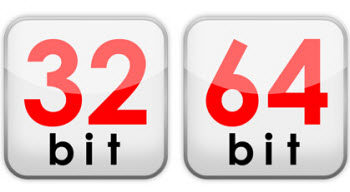Top 5 Questions and Answers You should Know about 32-bit and 64-bit versions of Windows

When shopping for a new computer or updating an old one, sales will recommend a computer that is a 64-bit version. Many people are unclear on what exactly it means. So, we're going to look at some frequently-asked questions and provide the answers about 32-bit and 64-bit versions of Windows for your reference.
Question 1: What is the difference between 32-bit and 64-bit versions of Windows?
The main difference between 32-bit processors and 64-bit processors is the speed they operate. 64-bit processors can come in dual core, quad core, and six core versions for home computing (with eight core versions coming soon). Multiple cores allow for increase processing power and faster computer operation.
Another big difference between them is the maximum amount of memory (RAM) that is supported. 32-bit computers support a maximum of 3-4GB of memory, whereas a 64-bit computer can support memory amounts over 4 GB.
Question 2: How to Tell If I Run the 32-bit or 64-bit version of Windows?
- For computer running Windows 8.1 or 8:
Step 1: Press the Win and X keys together to access the Power User Menu, which has a shortcut for Control Panel.
Step 2: Click "System" and "System type" will say either 64-bit Operating System or 32-bit Operating System. - For computer running Windows 7 or Vista:
Step 1: Open System by clicking the "Start" button, right-clicking "Computer", and then clicking "Properties".
Step 2: Under "System", you can view the system type. - For computer running Windows XP:
Step 1: Open System by clicking the "Start" button, right-clicking "My Computer", and then clicking "Properties".
Step 2: Check information under it.
- If you don't see "x64 Edition" listed, then you're running the 32-bit version of Windows XP.
- If "x64 Edition" is listed under System, you're running the 64-bit version of Windows XP.
Question 3: Which version of should I install: the 32-bit version or the 64-bit version?
First, it depends on the processor that you have on your computer. For instance, if you have a 32 bit processor chip (like Intel's Pentium or Celeron series), you have no option but to install the 32-bit edition of Windows.
However, if your CPU has a 64-bit processor (like Intel's Core i5 & i7 series or AMD's Phenom and Athlon range), you have the option to install both 32-bit x86 and the 64-bit x64 version of Windows. If so, we suggest you use 64-bit because 64-bit supports more RAM (> 4GB) so if you have any of the 'big' software applications (like a video editing software), it should run faster on a 64-bit Windows machine provided the RAM is more.
Question 4: Can I run 32-bit programs on a 64-bit computer?
All software programs written for 32-bit version of Windows should work on the 64-bit version of Windows as well though that's not true for hardware device drivers. Notable exceptions are many antivirus programs.
Device drivers designed for the 32-bit version of Windows don't work on computers running a 64-bit version of Windows. So if you have an old printer with a driver for x86 version of Windows, it may or may not be compatible with the 64-bit version of Windows.
Question 5: Can I run 64-bit programs on a 32-bit computer?
If the program is specifically designed for the 64-bit version of Windows, it won't work on the 32-bit version of Windows.
Device drivers designed for the 64-bit version of Windows don't work on computers running a 32-bit version of Windows.
- Related Articles
- how to reset administrator password in windows 8.1
- how to reset administrator password windows 7 safe mode
- how to crack computer password windows 8
comments powered by Disqus
